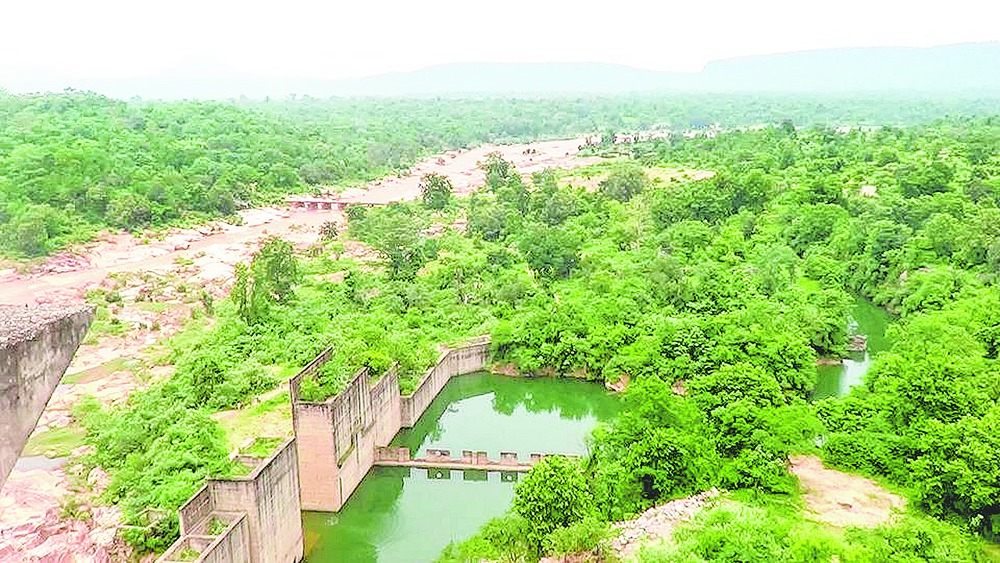
The fate of the North Koel Reservoir Project (NKRP), or Kutku dam, on the Bihar-Jharkhand border has been hanging in balance for the last four decades and more.
The dam - part of the North Koel Reservoir Project - is meant to irrigate about 1.24 lakh hectares of land in Aurangabad and Gaya districts of Bihar and Palamu district of Jharkhand, and also generate 24MW of hydel power.
The dam's fate was brought back into public consciousness by Union environment minister Prakash Javadekar on Tuesday while referring to a World Bank report on the ease of doing business in India.
Javadekar had pointed to the Kutku dam project to accuse the Nitish Kumar government of doing nothing to harness river waters.
He has blamed the previous government at the Centre and the Nitish regime in the state for the non-completion of the project, while at the same time assuring the people that work would be expedited. The move followed a presentation of the case by Bihar water resources department minister Vijay Kumar Choudhary at a high-level meeting in Delhi in May this year following which Javadekar ordered the constitution of a task force so that the grant of forest, environment and wildlife clearances for the project could be expedited. Javadekar had even visited the site meeting the villagers and assured them that work would start soon.
Work on the dam commenced in 1975 but stopped in 2007 following a directive from the Union ministry of environment and forests (MoEF), which objected to construction of an iron gate for storing water. The ministry stalled the construction, saying water accumulated in the dam would threaten the Betla national park in the Chhotanagpur plateau of Latehar district in Jharkhand and the Palamu Tiger Reserve. Following the directive, the Jharkhand government put the construction on hold. But construction of the gate alone would help irrigate about 1,000 acres in drought-prone districts of Bihar and Jharkhand.

Though the initial outlay of the project was estimated at Rs 30 crore in 1972, around Rs 755 crore has already been spent. The Central Water Commission revised the project cost four times, the last time in 1998, putting the estimated cost at Rs 1,289 crore. The project got delayed due to Bihar's division in November 2000, after which it became an inter-state one. The dam, barrage and part of the main canal fall in Jharkhand while the rest of the main canal and distributaries remain in Aurangabad and Gaya districts of Bihar.
A four-member team constituted by the MoEF in 2011 inspected the under-construction dam site to decide on clearance for construction of its iron gate, but nothing concrete happened. Even Maoists are opposing construction, arguing it would displace residents and forest dwellers. Also, the project, when completed, would flood 15 villages, five within the tiger reserve. The project would inundate about 4,200 hectares of forest area.
In 2014, addressing a rally in Gaya while campaigning for the Lok Sabha polls, Prime Minister (then PM-hopeful) Narendra Modi had made an issue out of the then UPA government stalling construction of the dam citing environment concerns. He had even tweeted, asking the Centre and Bihar government: "Why the delay in Kutku dam? Crores have been spent but nothing has happened."
After Modi became Prime Minister, hundreds of farmers from the Aurangabad region wrote a letter to Modi asking him to complete the Kutku dam, something he had promised during his campaign.
In 2011 itself, a four-member team of the Union ministry of environment and forest had made a visit to the dam to decide on clearance of the construction of an iron gate of the dam. However, the visit yielded no result.
Aurangabad MP Sushil Kumar Singh said, "In July 2012, a delegation of MPs and MLAs from Bihar had met then Jharkhand chief minister Arjun Munda seeking his help to identify land for planting trees in the state, without which barrage construction work on the river Koel cannot make progress as per the Forest Area Act."
Singh said that though Munda assured them all possible help for finding land for tree plantation, nothing has been done so far. It was also decided at the meeting that if both Bihar and Jharkhand failed to identify land, the Centre would be requested to relax the criteria. The Centre had earlier given relaxation in case of a mining project in Chhattisgarh, Singh said.










